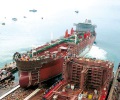

The Korean Fair Trade Commission (FTC) has turned out to be the only one among the fair trade watch dogs in six countries that has not yet completed the first phase of the review regarding the merger between Hyundai Heavy Industries (HHI) and Daewoo Shipbuilding & Marine Engineering (DSME).
Among the six countries, China, Kazakhstan and Singapore have completed their reviews and given unconditional approval, but the remaining three — Korea, Japan and the European Union — are still reviewing the matter, according to Rep. Kang Min-guk of the People Power Party on Oct. 4.
Hyundai Heavy Industries submitted an application for a business combination review to the FTC on July 1, 2019. But the commission has been reviewing it for two years and three months and is still in the first phase of the review. Japan completed the first phase of its review in March 2020. The European Union (EU) began the second phase of its review in December 2019.
The lawmaker’s office noted it is a serious problem that the Korean FTC has failed to wrap up even the first round of the review, given that the issue is closely related to Korea’s national interests. Accordingly, the lawmaker urged the Korean FTC to disclose a specific business combination review plan.
“Considering that DSME’s operating loss hit 1.2 trillion won in the first half of 2021, the company’s need to attract strategic investment, including 2.5 trillion won from HHI, has become all the greater,” Rep. Kang said. “There is a concern that a crisis may recur due to slow recovery in ship prices despite rapidly rising costs such as steel prices. We are concerned that the FTC’s prolonged business combination review could undermine employee morale at DSME and adversely affect its sales activities.”
However, if the EU completes its business combination review, the Korean FTC is expected to quickly follow suit. The merger between the two companies is possible only with the approval of all the judging countries. The EU is concerned about the two Korean shipbuilders’ possible monopoly on orders for LNG carriers after their merger.
Source: Business Korea